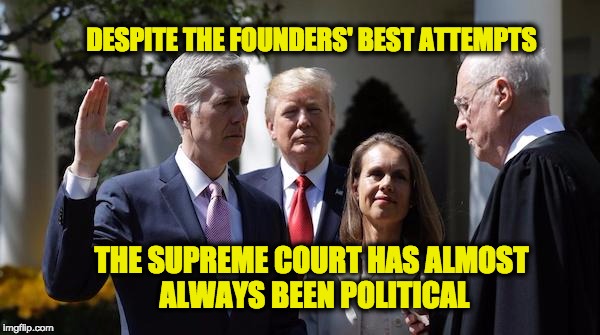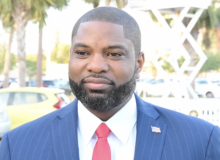By Joe Messina and Jeff Dunetz
Chief Justice Roberts, recently speaking at an event, stated that the biggest issue facing the Supreme Court would be politicization!
“When you have a sharply political, divisive hearing process, it increases the danger that whoever comes out of it will be viewed in those terms,” he said. “If the Democrats and Republicans have been fighting so fiercely about whether you’re going to be confirmed, it’s natural for some member of the public to think, well, you must be identified in a particular way as a result of that process.”
“We don’t work as Democrats or Republicans,” the chief justice said, “and I think it’s a very unfortunate impression the public might get from the confirmation process.”
Sorry Justice Roberts, it’s way too late!
Many Democrats will say that not considering Barack Obama’s Court nomination of Merrick Garland was an overtly political act. Republicans contend the recent attempt to filibuster Neil Gorsuch was nothing but politics. They are both right. The politicization of the Supreme Court, indeed the entire federal court system is almost as old as the courts themselves.
Lets start with the basics.
There are NO official qualifications to be considered for the Supreme Court. Technically, there is nothing to keep ME from being nominated (or you)!
The Constitution does NOT call out the number to serve on the court, I suppose there is a minimum (one). It also defines what they are to do. They are NOT to make law. Their ONLY job is to decide whether the law created violates the Constitution.
Think back to high school history class and remember that it took the famous case of Marbury v. Madison in 1803. In their decision the Supreme Court announced for the first that a court may declare an act of Congress void if it is inconsistent with the Constitution. They didn’t make up that power, although it wasn’t specifically outlined in the Constitution, it was clearly the intent of the founders as the judicial review of laws was explained by Hamilton in Federalist #78.
But what is supposed to happen when the Court deems a law unconstitutional is that the legislative body is to redo, rewrite, or let the law die.
The Court started off with 6 justices and has fluctuated to as high as ten. Congress passed a law called the Judicial Circuits Act that brought the number of justices to 7 and specifically prevented Lincoln’s successor, President Andrew Johnson (D) from appointing anymore judges. Congress later raised it to 9.
President Franklin D. Roosevelt (D) decided he needed more justices. Six more to be exact. As any good Democrat would do, when you can’t get win in the Court– tweak the system The Supreme Court kept ruling against FDR’s New Deal executive orders and the laws he was pushing. He didn’t like that—so he tried to stack the deck with “New Deal” friendly justices.
FDR had won in a landslide and acted more like a God than a president. FDR proposed replacing all justices over the age of 70 by offering them full pay if they would retire immediately. If they refused, he planned to appoint an “assistant” with FULL voting rights to insure his majority (sounds like Obama got his “slither around the laws” game plan from FDR!) Thank God most Republicans and Democrats saw this as a dangerous power grab and opposed the proposal.
Like any good despotic threat, a few justices got nervous and voted to allow FDR to push through the National Labor Relations Act and the Social Security Act. Similarly President Obama’s warnings led Justice Roberts to change his vote at the last moment to rule that Obamacare’s mandate was constitutional.
Even though the Senate was smart enough to kill his plan to stack the Supreme Court, FDR was President for a little over a dozen years, therefore he ended up appointing 7 of the 9 justices before he died.
According to our Constitution, a Supreme Court Justice can be impeached by the House of Representatives and removed from office if convicted in a Senate trial. Section 1 of Article III in our U.S. Constitution states that judges of Article III courts shall hold their offices “during good behavior.” The phrase “good behavior” has been interpreted by the courts to be the same level of seriousness used for the ‘high crimes and misdemeanors” guidelines.
The “good behavior” clause seems to have a real muddied meaning. One of the original signers of the Constitution, Samuel Chase, who later became a Supreme Court Justice, was accused by the House of Representatives of letting his “political leaning” get in the way of his rulings and served him on 8 counts. He started off as a staunch State Rights jurist but swayed to a Federalist. At the time when states were very concerned about retaining power to govern themselves, this was considered a very alarming political shift away from the Constitution. However, the Senate ended up acquitted him.
Knowing the power the Court wields and how much more partisan our elected officials have become, Chief Justice Roberts’ concerns are valid.
Every President I have seen nominate a Supreme Court Justice has used their political party preference as guidelines. Democrats seem to want justices to be law tweakers and givers and to treat the Constitution as a living breathing document to be tweaked and twisted to meet the Liberal ideological foundations and make the law fit their way of governing. Republicans seem to want the Constitution to be interpreted in the strictest way as the Founders intended it.
In recent years the Democrats fought against and at times slandered any potential Justice who believed the Court’s job was to interpret the constitution…not amend it. It began with President Reagan’s nomination to the Court of a brilliant jurist, Robert Bork.
The Democrats in the Senate led by Senator Ted Kennedy didn’t just object to the Bork nomination, they did their best to slander the man, vilifying him as evil. This infamous quote of Ted Kennedy’s was made even before the senate held hearings and presented the worst of the slanders:
“Robert Bork’s America is a land in which women would be forced into back-alley abortions, blacks would sit at segregated lunch counters, rogue police could break down citizens’ doors in midnight raids, schoolchildren could not be taught about evolution, writers and artists would be censored at the whim of government, and the doors of the federal courts would be shut on the fingers of millions of citizens for whom the judiciary is often the only protector of the individual rights that are the heart of our democracy,”
That was the same Kennedy who was not only responsible for the death of Mary Jo Kopechne but according to one biographer enjoyed jokes about the tragedy, and who during Reagan’s first term told Russia that in the interest of world peace, he will help them fight against President Ronald Reagan’s “militarism.”
Siding with the morality-challenged Kennedy Bork’s nomination was rejected by the Senate in a 58-42 vote.
What worked for Bork, was tried for Clarence Thomas (remember Anita Hill).
In 2006 when Justice Alito was first nominated to the Court, Sen. John Kerry (D-MA) Led an unsuccessful filibuster and did his best to smear Alito (perhaps because he didn’t have Israel to lie about yet), saying:
“Judge Alito will take America backward, especially when it comes to civil rights and discrimination laws. It’s our right and our responsibility to oppose him vigorously and to fight against this radical upending of the Supreme Court.”
One of the Senators who supported Kerry’s effort was the Junior Senator from Illinois Barack Obama. January 29, 2006, Mr. Obama told Democratic Party operative George Stephanopulos on “This Week” that he would “be supporting the filibuster because I think Judge Alito, in fact, is somebody who is contrary to core American values, not just liberal values, you know. When you look at his decisions in particular during times of war, we need a court that is independent and is going to provide some check on the executive branch, and he has not shown himself willing to do that repeatedly.”
The Democrats tried to make a similar case against Eric Garland whose confirmation hearings we just witnessed.
Some of our Founding Fathers knew this would happen when they started this great experiment. They even tried to safeguard against it. According to Hamilton in Federalist #78 (which was before he performed in Broadway musicals), Hamilton spoke of the lifetime appointments of federal judges contributing to their independence and political fads.
If, then, the courts of justice are to be considered as the bulwarks of a limited Constitution against legislative encroachments, this consideration will afford a strong argument for the permanent tenure of judicial offices, since nothing will contribute so much as this to that independent spirit in the judges which must be essential to the faithful performance of so arduous a duty.
This independence of the judges is equally requisite to guard the Constitution and the rights of individuals from the effects of those ill humors, which the arts of designing men, or the influence of particular conjunctures, sometimes disseminate among the people themselves, and which, though they speedily give place to better information, and more deliberate reflection, have a tendency, in the meantime, to occasion dangerous innovations in the government, and serious oppressions of the minor party in the community.
Despite the above and other elements supposedly shielding the judicial branch from politicization, the founders seemed to know that political partisanship would be a disease that would not only overtake the Supreme Court but the entire country.
John Adams said:
“There is nothing which I dread so much as a division of the republic into two great parties, each arranged under its leader, and concerting measures in opposition to each other. This, in my humble apprehension, is to be dreaded as the greatest political evil under our Constitution.”
Sound like today’s news?
George Washington made a point of this in his farewell speech:
“The alternate domination of one faction over another, sharpened by the spirit of revenge, natural to party dissension, which in different ages and countries has perpetrated the most horrid enormities, is itself a frightful despotism … The disorders and miseries, which result, gradually incline the minds of men to seek security and repose in the absolute power of an individual; and sooner or later the chief of some prevailing faction, more able or more fortunate than his competitors, turns this disposition to the purposes of his own elevation, on the ruins of Public Liberty”
Washington went on to imply that a two-party system is dangerous and that loyalty to a party may trump patriotism. Adams stated that people will tend to line up with a party leader and not the country leader and that this is very dangerous.
Many Liberals love to degrade our Founding Fathers. But they knew how power would really corrupt people and that adding parties to the mix would eventually divide the country. For a bunch of old white, slave owners they had their finger on it. They knew what would happen as we got more politically entrenched.
The United States is becoming a suburb of the Democrat or Republican Community. We have become way too divided. Until we become Americans again, true freedom-loving, liberty-loving, Constitution-knowing Americans this new “Cold” Civil War will continue.
And to Chief Justice Roberts, you are partially correct sir, the court has become politicized but that happened many, many, many years ago! And even you have been subject to political influence.In your position as Chief Justice you folded to political pressure in the Obamacare mandate ruling
Parts of this post were originally seen at The Real Side
Joe Messina’s radio show The Real Side can be heard daily across the airwaves and over the internet on several stations. He has loyal listeners in 42 states and 38 countries, and the list keeps growing (you can listen live M-F between 9PM and 12AM Eastern by Clicking Here). Joe also runs The Real Side website where you can read conservative commentary from him and his engaging contributors.






